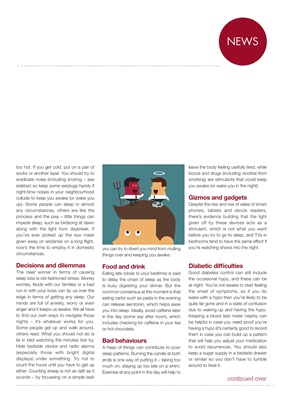
continued over
NEWS
too hot. If you get cold, put on a pair of
socks or another layer. You should try to
eradicate noise (including snoring - see
sidebar) so keep some earplugs handy if
night-time noises in your neighbourhood
collude to keep you awake (or wake you
up). Some people can sleep in almost
any circumstances, others are like the
princess and the pea - little things can
impede sleep, such as birdsong at dawn
along with the light from daybreak. If
you've ever picked up the eye mask
given away on airplanes on a long flight,
now's the time to employ it in domestic
circumstances.
Decisions and dilemmas
The clear winner in terms of causing
sleep loss is old-fashioned stress. Money
worries, feuds with our families or a bad
run-in with your boss can tip us over the
edge in terms of getting any sleep. Our
minds are full of anxiety, worry or even
anger and it keeps us awake. We all have
to find our own ways to navigate those
nights - it's whatever works for you.
Some people get up and walk around,
others read. What you should not do is
lie in bed watching the minutes tick by.
Hide bedside clocks and radio alarms
(especially those with bright digital
displays) under something. Try not to
count the hours until you have to get up
either. Counting sheep is not as daft as it
sounds - by focussing on a simple task
you can try to divert you mind from mulling
things over and keeping you awake.
Food and drink
Eating late (close to your bedtime) is said
to delay the onset of sleep as the body
is busy digesting your dinner. But the
common consensus at the moment is that
eating carbs such as pasta in the evening
can release serotonin, which helps ease
you into sleep. Ideally, avoid caffeine later
in the day (some say after noon), which
includes checking for caffeine in your tea
or hot chocolate.
Bad behaviours
A heap of things can contribute to poor
sleep patterns. Burning the candle at both
ends is one way of putting it - taking too
much on, staying up to late on a whim.
Exercise at any point in the day will help to
leave the body feeling usefully tired, while
booze and drugs (including nicotine from
smoking) are stimulants that could keep
you awake (or wake you in the night).
Gizmos and gadgets
Despite the rise and rise of sales of smart
phones, tablets and ebook readers,
there's evidence building that the light
given off by these devices acts as a
stimulant, which is not what you want
before you try to go to sleep, and TVs in
bedrooms tend to have the same effect if
you're watching shows into the night.
Diabetic difficulties
Good diabetes control can still include
the occasional hypo, and these can be
at night. You're not awake to start feeling
the onset of symptoms, so if you do
wake with a hypo then you're likely to be
quite far gone and in a state of confusion
due to waking up and having the hypo.
Keeping a blood test meter nearby can
be helpful in case you need proof you're
having a hypo (it's certainly good to record
them in case you can build up a pattern
that will help you adjust your medication
to avoid recurrences. You should also
keep a sugar supply in a bedside drawer
or similar so you don't have to fumble
around to treat it.